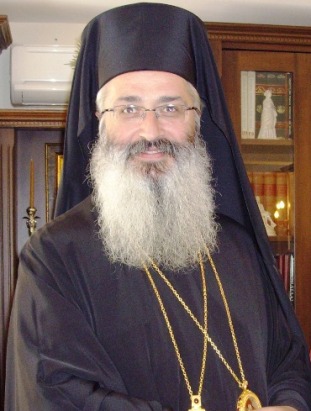The modern Greek province of Thrace, a region in the north of Greece, has been a source of trouble for a long time. Poverty, unemployment, and demographic problems are leading to a diminishing Christian population in this region, and to a weakening of that population's position. Meanwhile, neighboring Turkey is taking advantage of the existing problems to further its own interests. The Greek Church is particularly worried about the plight of the Christian population of western Thrace. At one recent meeting of the Holy Synod, the question was even discussed of providing financial benefits to families with three or more children there.
In the words of the Greek newspaper, Democratia, the bishop's role in the diocese located on the country's border is extremely complex—he must combine spiritual work with protecting national interests. Metropolitan Anthimos of Alexandroupolis and Samothraki is very capable of coping with the problems in this border region, where he was born, and is just the person to fulfill this difficult mission.
The fifty-year-old hierarch received journalists in the St. Anthimos Church and Cultural Center of Alexandroupolis, and gave an interview to Democratia, in which he spoke openly about burning issues.
* * *
—Your
Eminence, you care for the spiritual needs of a
border diocese that is extremely
"sensitive". What does this involve, and
what is the Church's role here?

Metropolitan Anthimos of Alexandroupolos
—The task of the clergy in this border region of our country cannot but be many-sided. However, the main thing is responsibility for the spiritual progress of our Christians.
Therefore, we clergymen try, through an active liturgical life, and especially through sermons and confession, to support the spirit of our faithful, and console them in their weaknesses.
Also, we try to help, as much our financial resources allow, to resolve our neighbors' problems, of both an everyday and emergency character. As you understand, this activity of ours is not limited to the Christian population only.
—Here, Orthodox Christians and Moslems are called to live together. On what level is this relationship today?
—On a significantly better level than they were in the past. Nevertheless, further steps must be taken on both sides.
On one hand, society should not tolerate any manifestation of discrimination with respect to the Moslem minority, but the minority should not allow itself to be exploited and used to someone else's aims, no matter who they are.
—They say that certain circles—for example, the Turkish consulate—use the Moslem minority to their own aims…
—Not much effort is needed to state that fact. The Turkish consulate takes political steps, not limiting itself to exclusively consular powers.
It uses terror tactics in relation to the Moslem communities. Besides that, the civil "pannikhidas" for Akhmet Sadik[i] (and as we know, the Moslem religion does not provide for pannikhidas), highly publicized visits by politicians from the neighboring country (calling the Moslems Turks, and Turkey their motherland), as well as tolerance with respect to Sharia law (a scandal and reproach to the judicial powers of our European country)—this is nothing other than a tactic of using a minority, with our government's criminal indifference.
—To what extent does the current atmosphere justify your flock's anxiety?
—There is only one problem in our homeland, and it is demographic! From it come xenophobia, the economic crisis, and unemployment.
Thrace is like a thermometer, a compass, which shows where Greece is going. Athens is not even capable of looking into this destructive course. Nevertheless, it is clearly seen in Thrace.
We see it and cry out. If some decisive measures are not taken (which we have proposed), the anxiety of the Thracian Christian world will lead to dissatisfaction and destabilization in the region, and this will spread out to the whole country.
—You have personally expressed your concern over a new wave of migration of Orthodox Christians. How could this be prevented?
—Many years of joblessness in our region have been a scourge for the Moslem and Christian populations alike.
Nevertheless, the Moslems make use of our country's rich natural resources. The gentrified Christians behave themselves in the opposite manner—unemployment pushes them to migrate to Athens, Thessaloniki, and abroad.
—Decisions are made in our capital by people who are partially acquainted with the particularities of your region. What recommendations would you make to the central government?
—When politicians and commissioners come to visit us from the capital, we acquaint them with the situation, offer our views, and request institutional intervention.
When they reply that the same problems are being experienced in Evritania [a municipality in central Greece —OC], we understand how far they away they are and how little they know about the specifics of our region.
I will express it more clearly: Thrace should remain a model of European cultural coexistence.
If it generates disproportionate cultural and national or developmental problems, then not only our country, but also all of Europe will enter upon a course of unprecedented upheavals.
A small, barely noticeable earthquake in the spiritual foundations of Thrace will send a tsunami through all the seismological layers of European cultural relations.
From a Russian translation by Anatoly Churikov for
Pravoslavie.ru
From:
Romfea.gr
English translation by OrthoChristian.com
